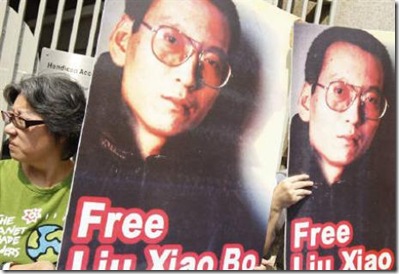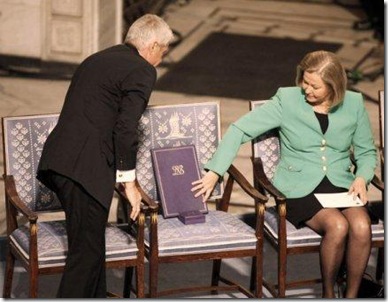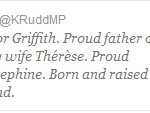Chinese pro-democracy activist, Liu Xiaobo, is awarded the Nobel Peace Prize amid controversy between pro and anti-China supporters.
For the first time since 1936, the Nobel peace prize could not be presented today either to its laureate or, as the prize rules require, to a close relative. “No medal or diploma will be presented today,” the committee’s chairman, Thorbjorn Jagland as the prize winner is unable to attend.
China, drawing on its growing economic clout in the world, has mounted a campaign to encourage countries to boycott the ceremony. China declared that the “vast majority” of nations would boycott but the Norwegian award committee said two-thirds of those invited would attend. Among the countries not attending were Russia, Kazakhstan, Saudi Arabia, Tunisia, Pakistan, Serbia, Iraq, Vietnam, Iran, Afghanistan, Egypt, Sudan, Cuba, Morocco and Algeria.
According to the Nobel Institute, 44 embassies have accepted invitations and 19 have refused “for various reasons”, while two have not replied. Ukraine and the Philippines had at first declined their invitations, but Nobel Institute director Geir Lundestad said Thursday they had changed their minds. Serbia, which had initially refused the invitation, said Thursday it would be sending a representative after all. Russia, which signed trade agreements with China last month worth 8.5 billion dollars, has officially pleaded prior engagements for its absence.
The non attending versus the attending definetly indicates or gives us an idea where the line is drawn and who ( country ) stands where if a situation arises , similar to what Kevin Rudd said recently as disclosed in the wikileaks.org “ preparing to deploy force if everything goes wrong” .
The obvious variables to consider are alliance patterns, regime type, trade with/aid from China, proximity to Beijing, and maybe a corruption measure. That said, if you look at the list of all foreign embassies in Oslo, there are some interesting questions to ask. Why is Thailand attending but not the Philippines? Why is Colombia joining Venezuela in not attending? Why is Vietnam, an enduring rival of China, allying with China on this issue?
Embassies are not required to explain why they accept or decline a Nobel invitation, but a senior Filipino diplomat spoke candidly, underlining China’s growing power, especially in Asia.
“We do not want to further annoy China,” he said.
India plans to attend the ceremonyat which the Nobel Peace Prize is to be presented to Chinese dissident Liu Xiaobo, Foreign Minister SM Krishna said Thursday. New Delhi is disregarding Beijing’s request for an international boycott of the event
Nominated for his “long and nonviolent struggle for fundamental human rights in China“, Liu, a 54-year-old critic and writer, is serving an 11-year prison sentence for inciting subversion after coauthoring Charter 08, an appeal for democratic reform. His wife, Liu Xia, has been under house arrest since the award was announced last month. Liu is married, but has no children. His wife has remained under police surveillance at the couple’s home in central Beijing since her husband was imprisoned.
It was the first time that a laureate under detention had not been formally represented since Nazi Germany barred pacifist Carl von Ossietzky from attending in 1935. Several jailed or detained laureates since had been represented by family but China did not allow anyone near Liu to travel to Oslo
China appeared to have blocked Western news websites, including the BBC and CNN, and state media made no mention of the ceremony, aside from a statement condemning the prize Ref ( http://tvnz.co.nz/nobel )
Winners of previous Nobel prize
Winners of the Nobel Peace Prize since 1980:
– 2010: Chinese dissident Liu Xiaobo.
– 2009: US President Barack Obama
– 2008: Martti Ahtisaari
– 2007: Intergovernmental Panel on Climate Change, Al Gore
– 2006: Muhammad Yunus, Grameen Bank
– 2005: International Atomic Energy Agency, Mohamed ElBaradei
– 2004: Wangari Maathai
– 2003: Shirin Ebadi
– 2002: Former US President Jimmy Carter
– 2001: United Nations, Kofi Annan
– 2000: Kim Dae-jung
– 1999: Medecins Sans Frontieres
– 1998: John Hume, David Trimble
– 1997: International Campaign to Ban Landmines, Jody Williams
– 1996: Carlos Filipe Ximenes Belo, Jose Ramos-Horta
– 1995: Joseph Rotblat, Pugwash Conferences on Science and World Affairs
– 1994: Yasser Arafat, Shimon Peres, Yitzhak Rabin
– 1993: Nelson Mandela, FW de Klerk
– 1992: Rigoberta Menchu Tum
– 1991: Aung San Suu Kyi
– 1990: Mikhail Gorbachev
– 1989: The 14th Dalai Lama
– 1988: UN Peacekeeping Forces
– 1987: Oscar Arias Sanchez
– 1986: Elie Wiesel
– 1985: International Physicians for the Prevention of Nuclear War
– 1984: Desmond Tutu
– 1983: Lech Walesa
– 1982: Alva Myrdal, Alfonso Garcia Robles
– 1981: Office of the UN High Commissioner for Refugees
– 1980: Adolfo Perez Esquivel
Related Links








Leave a Reply
You must be logged in to post a comment.